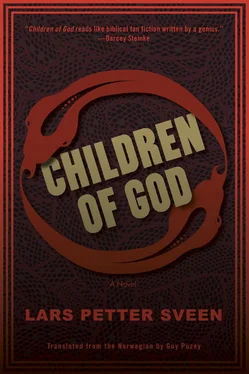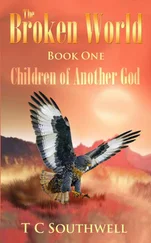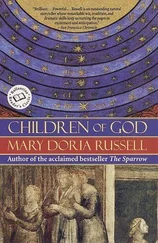“I don’t know how you got him down,” Reuben said.
Jehoram was just a shadow in front of us now. It seemed as if he were still talking to himself, but we couldn’t make out his words anymore.
“I must keep an eye on Jehoram,” I said.
When daylight came, through a long, narrow gap at the end of the world, we stopped by a small grove of trees. People had been there before us. The grass had been trampled; there were the blackened remains of a fire. I treated Jehoram’s hands with ointment and wound them up in a blanket. Jehoram smiled at me, and a sound came from his mouth, as if he had something stuck in there. Reuben lay down next to us. Jehoram wrapped his face in a thin, dark strip of cloth, and I helped him down to the ground. I said I could keep watch, and Reuben muttered that I should wake him when I needed some sleep too.
“If I dream about Nadab, please wake me up,” Jehoram said. His words were muffled behind his dressings. I folded up my own blanket and put it under his head.
“What should I tell him?” Jehoram asked. I looked across at Reuben, but his eyes were closed. Birds were singing up in the trees, sunlight shining softly through the twigs and leaves.
“What should I tell him?” Jehoram asked again.
“Don’t tell him anything,” I said. “Don’t ask him to come back.” Jehoram lay still, his face hidden behind the dressings.
“Yes,” he said.
We made it to Jaffa, but we stayed there for only a few days before starting the journey to Antioch. On the way there, we met a group of several children, who started to scream when they saw Jehoram. He tried to catch some of them, but Reuben and I held him back. In Antioch, we knocked a man to the ground and robbed him, then we filled his clothes with rocks and threw him in the Orontes River. Another man we took had Roman coins carved out of wood stuffed in a purse. Jehoram kicked the man in the face so hard and so many times that he started gurgling before he died. Reuben took the small wooden coins and burned them on the fire that same night. He said there was no beauty left in the world and wondered who the hell made coins out of wood. One evening we were stopped by some soldiers, but they let us go once we’d given them all the stolen money we had on us.
And there are also many other things that we did. If I told all of them, I suppose that the world could not contain a faith like the one for which Nadab died.
5  THE BLACK BIRD
THE BLACK BIRD
I
On her way to the well, Anna noticed a bird with feathers so black, but with a gaze so empty and distant, that it reminded her of Andrew. Of all the men she’d had, Andrew, her fourth, was the only one who stroked her on the cheek, who kissed her neck softly, who let her lie on top. Andrew, oh, Andrew! What was wrong with her? Why did the mere sight of a bird remind her so much of him? One morning, he’d leaned down to her, whispered a few words in her ear, “I’ll return,” and left. He was seen around the sixth hour, wandering out of Sychar in the direction of Judea, and then he vanished. She missed him. His smell, his gentle fingers, the way he sometimes slept with his eyes open, with a gaze so empty and distant. So she asked around, and a man thought that Andrew was there, in Sychar, in a small stone house on the edge of the city. But when she sought out the place, there were only two young shepherd boys living there, who both stared at her as if driven by an enormous hunger. Another man, a traveler from Nazareth heading to the Temple in Jerusalem, thought he’d seen Andrew in Samaria. But who knew if it was Andrew or somebody else? Anna tried to verify what the man had observed. Was his hair long and black, were his eyes dark, was his nose long and bent at the bridge, did he hold the fingers of his right hand up to his mouth, like he always did when he felt nervous? The man smiled at her and said he didn’t know.
Andrew had gone.
She thought of Ruth, her elder sister. Ruth always said that the men who came to them were men who’d lost their way. “All we need to do,” her sister said, “is to let them think they’ve found the way home.”
The bird was sitting in the thin top branches. Those black feathers and those black eyes. Anna looked down at the stones, the tufts of grass. A chill wind blew, taking hold of the trees, and when Anna looked up again, the bird had gone.
Voices were coming from the well. A group came walking toward her, heading down toward the city. Anna moved between the trees, put down her pitcher and stood there, watching the people pass. They were dressed in rags, filthy, men and children and a few women, holding each other’s hands. Anna picked up the pitcher and set off on the last short stretch to the well, but she stumbled on her sore leg and let out a slight whimper. A swollen red mark went from her calf down toward her ankle: Reuben’s mark. Andrew used to rub oil on her leg and foot. He’d never once asked her what had happened.
Reuben, her third man, and later her fifth too, had left that scar. She screamed so loudly when it happened, so loudly that he knelt down, started stroking her hair, and tried to make her quiet down. The white bone sticking out of her skin made her scream as if she were possessed. Looking back now, she can’t remember feeling pain, just a thud and a ringing in her ears. She fainted, came around, and fainted again.
Reuben carried her to an old man with pale eyes, who reset her bone.
“I’m blind, and yet I see many things,” the old man whispered. “I’m what stays in the shadows while the light falls elsewhere.”
She tried to stay awake, but her eyes slipped shut. The only details she remembered were that the old man smelled of earth and sour goat’s milk, and that there were small jars on the shelves along one wall. Anna can only just remember Ruth coming to find her.
“I’m going to heal your sister,” the old man said. “She’ll be able to start all over again.”
“I’ll look after her,” said Ruth. “She has nobody else but me. I have nobody else but her.”
“You don’t have each other anymore now,” the old man said. “She was given to me.”
“She hasn’t been given away to anybody,” said Ruth.
Everything was in fragments, and Anna floated between sleep as the voices buzzed around her.
“Let go of her,” said Ruth. “Let go of me, let us go.”
“She’s free,” said the old man. “Reuben’s made sure of that.”
And then Ruth disappeared, and the old man was left sitting by Anna. In a whisper, he told her to rest, close her eyes, take deep breaths.
Anna lay there for a long time before she came around, and for a few more days until she was able to get up. She kept asking for Ruth. Reuben came to collect her and carried her back home. He gave her something to eat and something to drink. His tough, broad face was unchanged. She asked where Ruth was. He kissed her, said that Ruth was fine, and carried on clumsily stroking her hair. One evening, when Anna’s throbbing pain wouldn’t let her sleep, he sang to her. His voice was so strangely soft and faint.
When Reuben left her the first time, it wasn’t the memories of when he broke her leg, beat her, or threatened her with a knife that made her hobble along the sides of the houses, asking if people had seen him. What made her hobble about were those times when he just sat there next to her. But she couldn’t find him, nobody knew anything. Then she asked about Ruth: “Where’s my big sister, have you seen her?” The answer was the same. Nobody knew. Not being able to speak to Ruth, not being able to hear Ruth’s voice or countless attempts to comfort her, made Anna keep looking. She walked around the outskirts of Sychar, staring at everything that seemed unusual, everything that seemed new. She walked through Shechem and came back in the evenings, alone and exhausted. She collapsed on the floor and prayed, talked to herself, tried to remember everything Ruth used to say to her. And when she couldn’t remember any more, when sleep descended on her like a heavy, warm blanket, she could hear Reuben singing faintly.
Читать дальше

 THE BLACK BIRD
THE BLACK BIRD









